© 2026 ALLCITY Network Inc.
All rights reserved.

As the losses piled up on this six-game road trip, Coyotes coach André Tourigny kept focusing on the positives. The Coyotes were making progress in their system play. The Coyotes were creating more offensive chances. The coaching staff was making tweaks to enhance both elements and Karel Vejmelka had solidified a shaky goaltending situation.
There was nothing wrong with Vejmelka’s game on Friday, but the rest of the team took a wrong turn in a 3-1 loss in Anaheim. Whatever momentum a winless bunch can build was lost in an array of defensive lapses, mental lapses, system breakdowns and, as Tourigny noted in his postgame comments, the most egregious sin of all.
“I think we did good things in the first period and after that it was a huge setback,” he said. “I’m not happy about the way we responded. I’m not happy about the way we behaved. I’m not happy about the way we worked.
“I felt for the first time all year we got outworked in the second period. That’s unacceptable. That’s not who we are. We need to take pride in those things. Mentally, it was the same. We had a lack of urgency. I understand we’re in a tough situation but nobody will feel sorry for us so we need to show more character in our situation.”
With the loss, Arizona tied the 2017-18 Coyotes for the longest winless streak (11) to start a season in franchise history. That mark also ties the 1995-96 San Jose Sharks, the 1973-74 Minnesota North Stars and the 1927-28 Pittsburgh Pirates for second place in the NHL record books, four games behind the 1943-44 New York Rangers, who went winless in 15 to start the season.
The Coyotes will host the expansion Seattle Kraken at Gila River Arena on Saturday. Another loss would set the franchise record and move them into sole possession of second place in the record books.
Here are five takeaways from Anaheim.
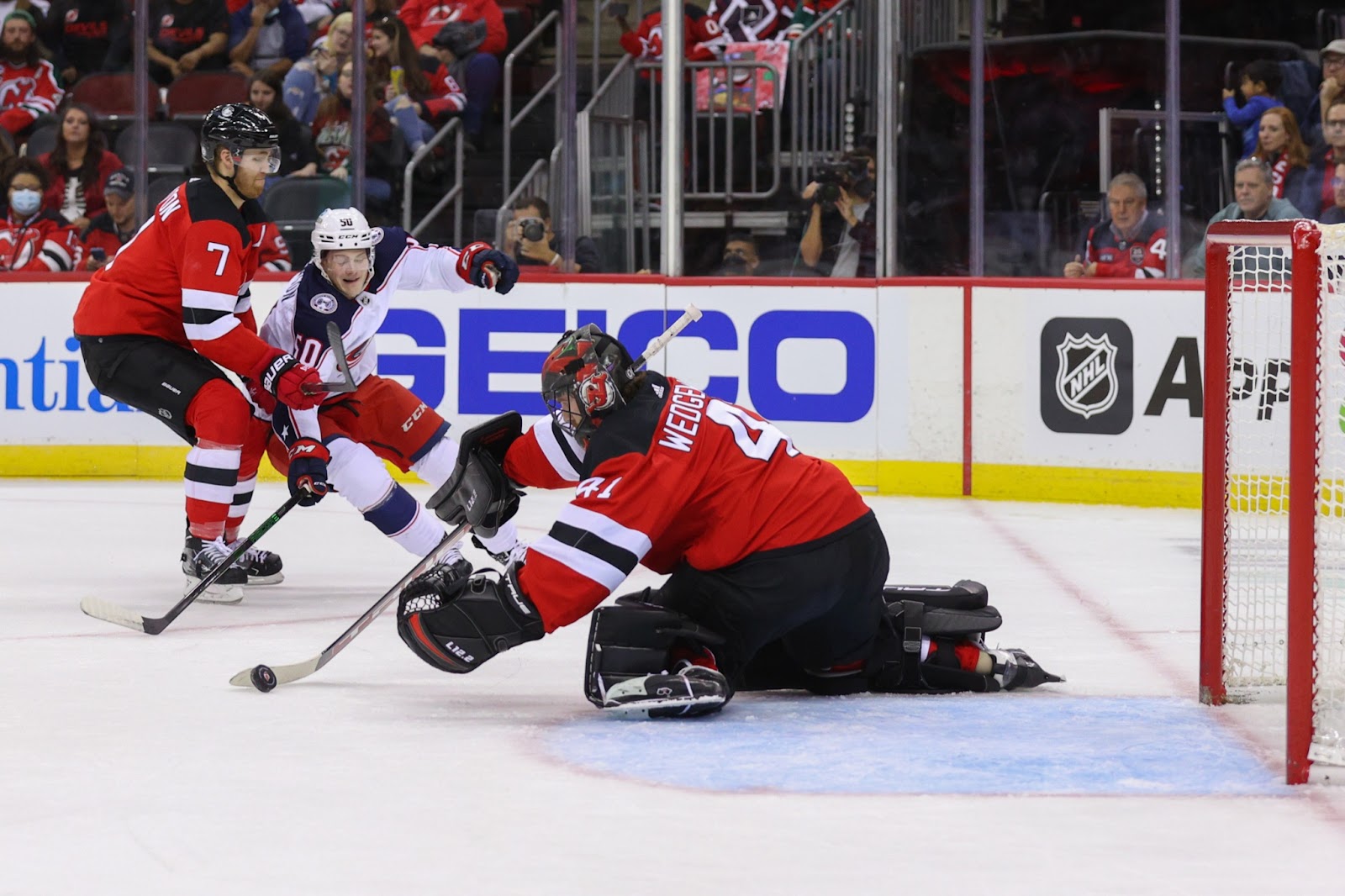
Wedgie joins Veggie
Scott Wedgewood has been with four NHL organizations and played for five AHL teams over the past five-plus years.
“I’m not trying to collect every jersey in the league,” he said. “I would like to have a home base.”
At least the Coyotes have limited Wedgewood’s travel each time he has joined their organization. When Arizona acquired him from New Jersey for a fifth-round pick on Oct. 28, 2017, all he had to do was move his bag from the Devils’ dressing room at Prudential Center down to the Coyotes dressing room, where Arizona was set to face the Devils.
When the Coyotes claimed him off waivers on Thursday, he left his equipment at Honda Center because the Devils had just played the Ducks on Tuesday.
“It’s exciting to get another crack at the league and not clear waivers and go down (to the AHL), but it definitely feels like a case of déjà vu,” he said. “It’s nice to see some familiar faces. The equipment staff is still the same but only about four actual players from my time here are still around so it was funny waking up with a whole new squad and introducing yourself 25 times over, but I’m used to it at this point.”
When assessing the ramifications of this move, there are two things to keep in mind. First, the Coyotes wanted to get goalie Ivan Prosvetov back to Tucson where he could play a lot of games and continue his development. Prosvetov played one game after his recall, a 5-1 loss at Tampa on Oct. 28.
“With Ivan, every time he comes up he gains a little more knowledge of playing in the National Hockey League,” GM Bill Armstrong said. “There’s a big difference in the quality of shooters you see in the American league compared to the NHL. It’s great to get a taste, gain that experience and learn some things he needs to work on and then go back down and apply them. We don’t want him sitting around. He needs to play.”
The second piece of this move is what happens when Carter Hutton returns from a lower-body injury, which could happen within a week. Wedgewood is on a two-way contract but he is not waivers-exempt. If the Coyotes were to waive him upon Hutton’s return, there is a fair chance that he could be claimed again with so many teams needing goaltending help. If that happens, the logjam would be solved. If not, the Coyotes would have to figure out what to do with him in Tucson, with Prosvetov needing to play and Josef Kořenář and Zane McIntyre also there.
Wedgewood is trying not to think about all of that. He got married last March before a justice of the peace and will have a full ceremony this summer. He and his wife, Brittany, bought a home in Plymouth, Michigan where he played his OHL hockey for the Whalers. Brittany and the couple’s two Bernedoodles, Captain and Bucky (named after Avengers), will join Wedgewood in Arizona shortly. What happens when Hutton returns is out of Wedgewood’s control.
“As a kid when you get in the league, you have all of these dreams and they pump you up like you’re supposed to take over and be the next (Martin) Brodeur, even though what he did was pretty much unreachable as a goalie,” said Wedgewood, a New Jersey third-round pick in 2010. “You want that dream. You want to make $50 million. You want to be the next big name but now that I’ve kind of bounced around I’ve kind of realized that if I play well and put up a good effort every night, I have a chance to stay in this league.
“There’s definitely no lack of wanting to still be in the Hall of Fame and still do everything that you can, but there’s not as much pressure to think I have to be the best every day, to do everything perfectly. It’s been a long road and I’ve put a lot of miles on the engine so just make the most of it.”
Wedgewood said his game has changed significantly in the four years since he was last with the Coyotes. He is more of a positional, let-pucks-hit-him goalie and he has taken bits of knowledge from the litany of goalie coaches and goalies with whom he has worked. While the Coyotes did not skate on Friday morning in Anaheim, Wedgewood was on the ice with goalie coach Corey Schwab.
Nobody has told him that he is starting Saturday’s game against the Seattle Kraken at Gila River Arena, but with a back-to-back, away-and-home situation, that is the normal course of action. And if Hutton’s return gets delayed, Wedgewood could see more action because the Coyotes have four back-to-back sets this month.
“I don’t think it’s anything where I’m gonna walk in and if I win a game I’ll be here for 20 years,” he said, laughing. “Everyone knows it’s a job and everyone knows the business so you do your job to help the business win and that’s the goal for everybody. I don’t know how long Carter is out and what his situation is, but obviously we need two goalies to play. At the moment, it’s me and Karel.”
Update:
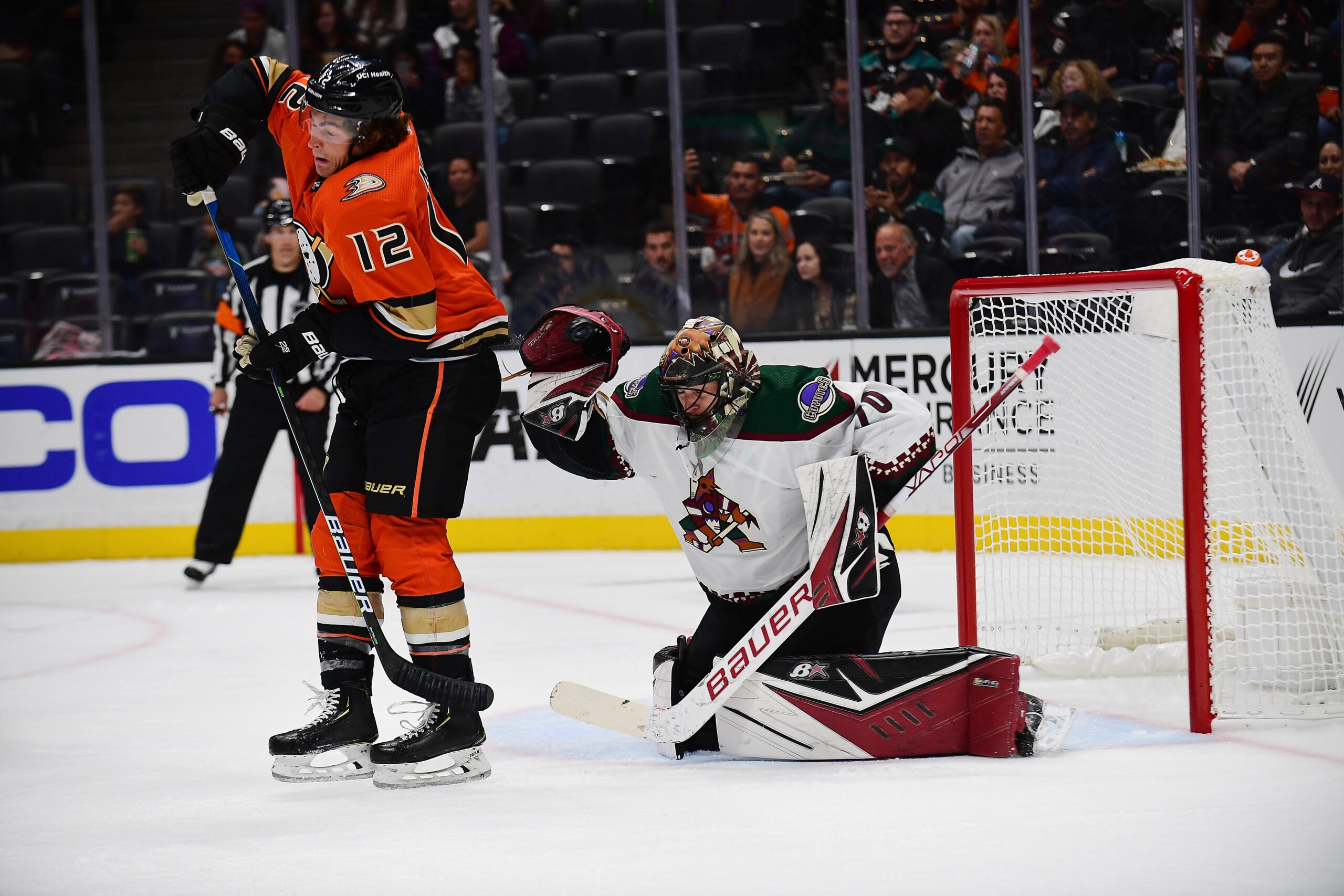
Vejmelka won’t be flipped
Bill Armstrong’s recent focus on turning current assets into future assets has created an expectation within the Coyotes fan base. Karel Vejmelka has appeared in just nine NHL games (seven starts), yet already, the fan base is pondering the idea of flipping him in a trade-deadline deal.
Slam the brakes on that thought. The Coyotes are not even considering that possibility. Goaltending is hard to find and Vejmelka is a product of the current scouting staff’s hard work; a potential diamond in the rough whom they mined and want to see progress over the course of the season.
The other side of this is that Vejmelka has instilled some level of confidence in the team in front of him with his play. With all of the other obstacles this season has thrown at the Coyotes, there is no way that Armstrong is going to rob the team of one of its few bright spots. Vejmelka isn’t going anywhere. Full stop.
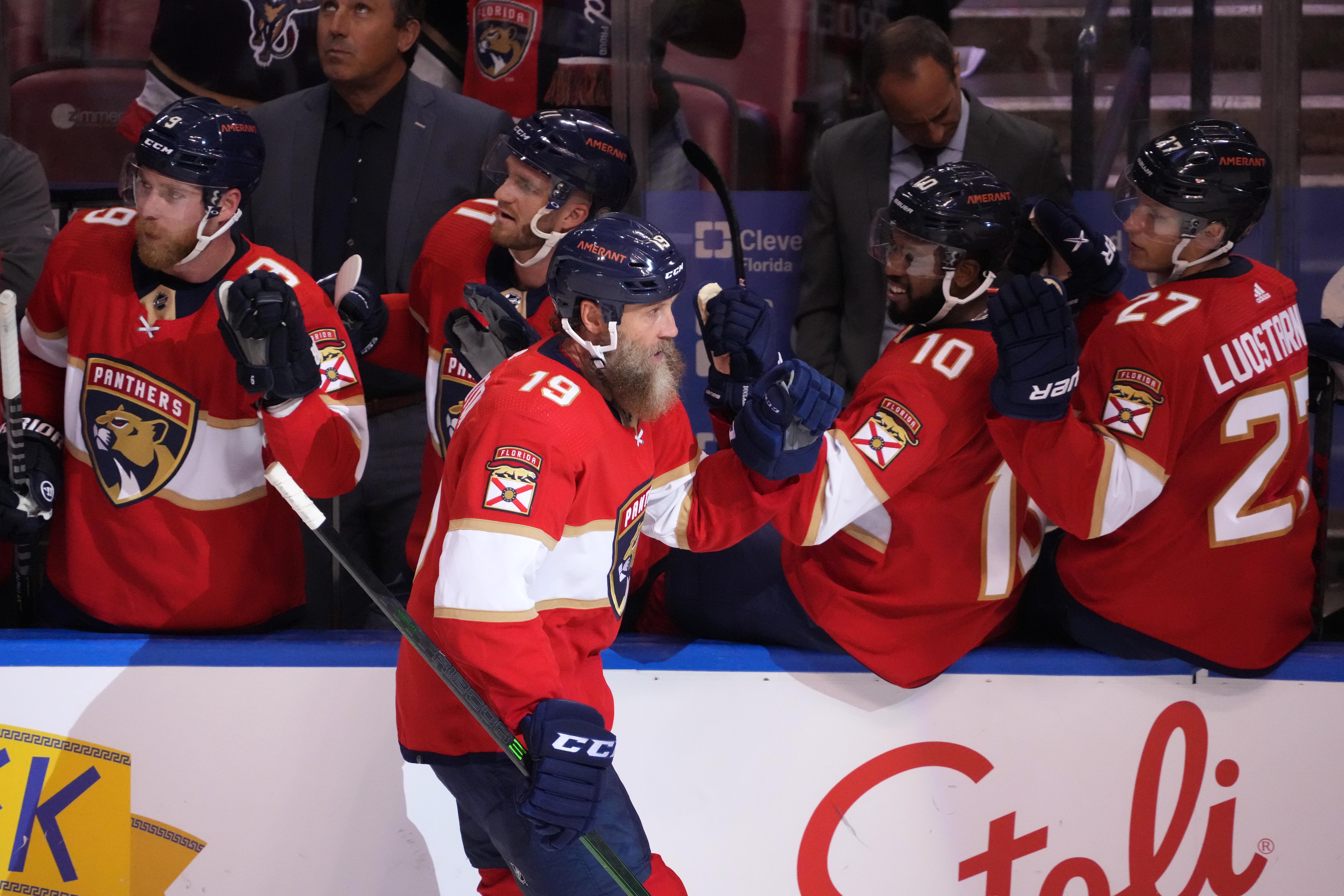
Penalty disparity
After Friday’s game, the Coyotes had taken 56 penalties and drawn 43. Their minus-13 disparity was the worst in the league, the 56 penalties taken were the most in the league.
The disparity was accentuated on this most recent road trip where the ability to draw penalties became a greater issue at Florida, Tampa, Washington, Carolina, Philadelphia and Anaheim. The Coyotes had 12 combined power plays in those six games, including zero against the Flyers. Their opponents had 25.
Part of that equation is simple: Good teams draw more penalties because they have more possession time and force the play, but there are ways in which the Coyotes can put themselves in position to gain more man-advantages, Tourigny said.
“We need to bring the puck to the net, we need to drive the net, we need to cut inside and push through the box out, push through the coverage, push through the one-on-one to try to force them to either take the hook or maybe we will get a scoring chance, maybe we will get a shot,” Tourigny said. “Normally, that’s where the most penalties are taken, around the net to deny a scoring chance, a shot or something like that.
“We’re going there. If you look at the percentage of screen shots we have, we have a good net presence but we need to be a little bit more active, bring a little bit more energy and bring a little more desperation around the net.”
When they do get a power play, of course, they’ll have to do something with it. The Coyotes power play is operating at a paltry 7.4-percent success rate, the second-worst mark in the league behind the Golden Knights’ scoreless power play. Arizona had a 5-on-3 on Friday and had just one shot on goal.
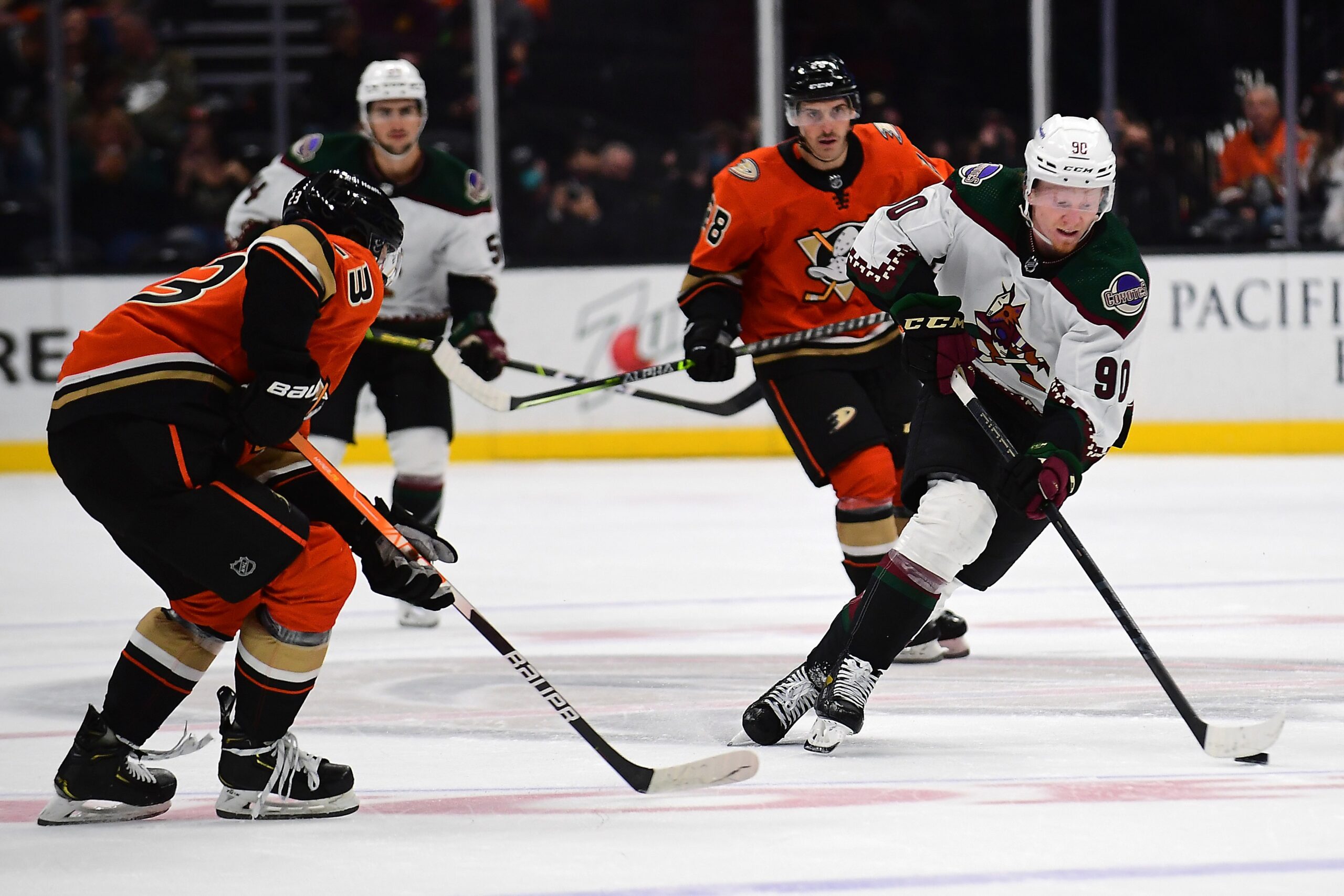
McCartney, Dineen debut
Forward Ben McCartney and defenseman Cam Dineen both made their NHL debuts on Friday, creating an interesting moment at the start of the game when rookies debuting generally enjoy a solo lap. We’ll call this a dual solo lap.
The two players took vastly different paths to get here. Dineen played four seasons and 140 games in Tucson. McCartney has played just eight AHL games.
“It’s been a long time waiting,” Dineen said. “It’s really exciting just to have been called up but then to get this game is super exciting.”
Dineen’s girlfriend drove over from Tucson and his parents flew in from Toms River, New Jersey. McCartney, a Manitoba product, said his parents and grandparents flew in for the game. McCartney had a terrific camp and preseason and has five goals and 10 points in his eight AHL games.
“There was a little bit of jitters,” he said. “I was just super excited, super pumped up playing my first game. I thought I managed it decently well and it was just nice to get it out of the way.”
More statistical ignominy
The 1928-29 Chicago Blackhawks hold the NHL record for the fewest goals per game in a season at 0.75 (33 goals in 44 games). The Coyotes are averaging 1.27 per game through 11 games (14 goals).
If that mark were to hold for an entire season, it would be the fifth lowest average in NHL history, and easily the worst mark of the modern era and any schedule that included at least 70 games.
The 2013-14 Buffalo Sabres averaged 1.98.3 goals per game over 82 games (150 goals).
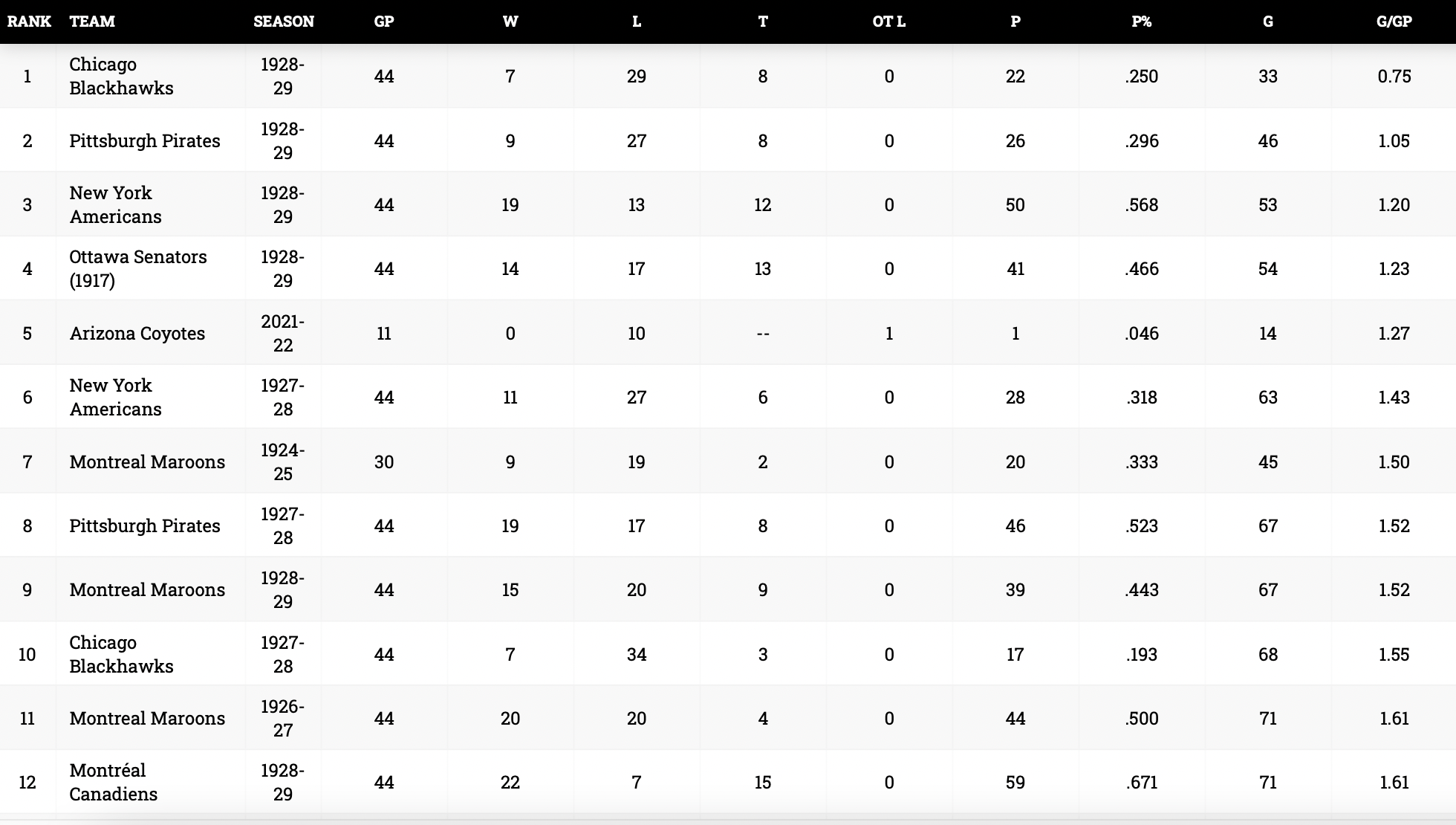
In their past eight games, the Coyotes have been shut out three times and they have scored more than one goal just once.
Follow Craig Morgan on Twitter
Comments
Share your thoughts
Join the conversation



